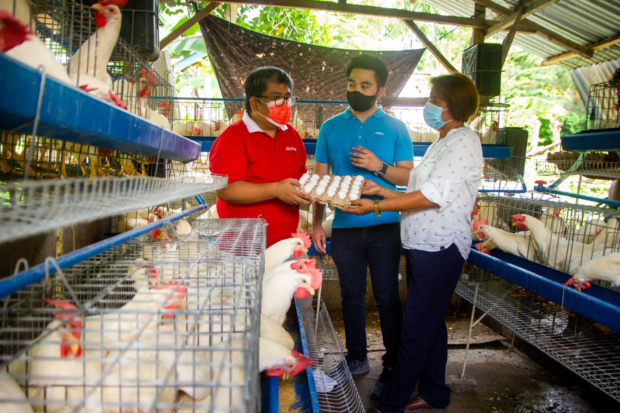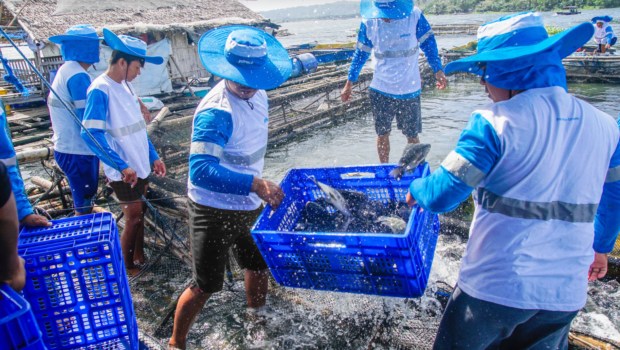Improving the Filipinos’ quality of life through food
The easiest way to measure one’s current living standard may just be by how much or how little (or conversely, how well) one can eat. These days it is common to see qualms about how little the daily minimum wage can now buy at the market or grocery compared to previous years. Recent social surveys have also pointed out that at least a third of Filipinos felt life has taken a turn for the worse this year, citing a poorer quality of life. The surveys also correlate the feeling of having a poor quality of life to the incidence of hunger.
Even the United Nations’ goals in eradicating poverty include addressing agricultural development and food and nutrition security as key factors. Unfortunately, according to recent projections, the world is “not on track” to achieve zero hunger and global nutrition targets.
We can owe this to the various challenges faced by our nation’s agricultural sector. Aside from a consistent decline in agriculture as a livelihood, those already within the industry have to contend with problems related to land access, technology and innovation, and sustaining markets. Climate change, of course, also remains a major risk looming overhead. Global events such as the Ukraine-Russia war and the ongoing COVID-19 pandemic have also bolstered the already existing problems in hunger levels and malnutrition.
Despite the grim playing field, governments and private institutions continue to develop solutions to address the many branches of this deep-rooted global hunger problem.
From farm to table
The idea of farm to table may more commonly bring to mind food trends and dining concepts, but it may also be a potential approach to solving larger food problems. To understand and thereby solve our ongoing food crisis, it’s important to go back to the roots—the farms from which our produce and livestock come from.

Farm to table. Pilmico’s strategic position in the food value chain gives them the opportunity to create solutions from the beginning of the chain with feeds and flour down to its farms and retail brands.
As Aboitiz Group is orbiting closer toward wrapping up a transformative year, its transition into the Philippines’ first techglomerate, Pilmico, the Group’s subsidiary for agribusiness and food, will continue to co-create solutions for the Filipinos. Pilmico is one of the organizations that understand the need to take a holistic approach if we truly want to improve the country’s food conditions. Over the years, they have launched and implemented various programs targeting different sectors of the agriculture industry.
In 2013, they started creating Pilmico livelihood kits, a flagship corporate social responsibility project that has since evolved into various partnerships with government agencies like the Department of Agriculture and Department of Agrarian Reform (DAR). The project is geared towards assisting backyard farmers and encouraging more low-income Filipinos in starting, managing, and sustaining their own agribusinesses.
These livelihood kits include provisions that would otherwise be more challenging to acquire, especially for farmers in farther areas. Among these are egg-laying machines, bakery starter kits, gilt dispersal, and aquaponics systems. In addition to the kits, Pilmico also provides technical assistance and training to further ensure sustainability.

Pilmico’s livelihood kits open opportunities for backyard farmers and bakers to gain new knowledge and skills to manage and sustain their own agribusinesses.
With its wide reach and network of partners, the conglomerate has also been able to support farming communities, especially in the aftermath of destructive and disruptive weather events. In 2014, Pilmico launched the “Save the Backyard Farmer” initiative after Typhoon Yolanda. From a project that helped uplift backyard and medium-scale farms, it has since evolved into a bigger “Mahalin Pagkaing Atin” program that not only promotes backyard farming and local produce, but also creates links and networks for beneficiaries from vulnerable areas and sectors of the country.
More recently, as the industry has faced challenges brought about by harmful animal diseases, Pilmico also took the initiative to construct a new breeder and nursery farm in Nueva Ecija. Launched in June this year, the farm has a capacity of 2,500 sow level and is expected to produce 4.7 million kilograms of pork annually.
This goes hand in hand with their triple-A-rated meat-cutting facility Tarlac MeatMasters. The facility, which uses state-of-the-art technology and equipment, blast-freezes its meat, keeping it fresh. The meats are now also available in the market through The Good Meat’s retail brand, which provides fresh cuts, marinated cuts, and ready-to-cook food in Luzon and Metro Manila.
A wider reach
As food maintains the farthest and deepest reach into our lives and industries, Pilmico and Aboitiz’ Food Group recognize that more work needs to be done. Aside from directly helping local farmers and the agribusiness sector, the group is also looking to expand into the feed business.
“For our regional feed business, we continually improve and enhance the values of these products which cater to a wide range of livestock—poultry, hogs, ducks, aqua, rabbits, even gamefowl, and pet food. It is important that we continue to grow our presence in the markets we are in; and we are looking to do this through capacity expansions in China and Vietnam,” says Pilmico president and CEO Tristan Aboitiz. “Equally important is that we ensure we continue to add value to our customers through our products and services, and we are giving this an extra level of focus in the group in 2022 through the expansion of our R&D capabilities across the region. We believe this to be another area of growth in 2023.”
Amid expansion, the company also continues to transform their star products. Pilmico’s consistently growing expertise in the flour, feeds, and farm businesses have also helped them create community programs that reach various areas in the country and the region.
Most recently, Pilmico has partnered with DAR Tarlac for their “Tinapay ti Uno” program. The result of this project is an updated and healthier recipe for nutribun, making use of local crops and produce such as guava, banana, monggo, malunggay, squash, and cow’s milk sourced from DAR’s agrarian reform organizations. The recipe is then set to be used for feeding programs.
An expanded product portfolio, taking into consideration needs of small and medium-sized bakers, is to be expected in 2023 as well, shares Aboitiz.
A holistic approach
The numerous projects initiated and implemented across various streams prove that a holistic vision can help efficiently address the many food problems manifesting in the country today. Pilmico, being part of the Aboitiz techglomerate, is in a good position to help make change happen.

Pilmico’s priorities in the coming years include continually improving and enhancing the quality of its products and expanding its production capacities across the regions where they operate.
With products that cater directly to the majority of consumers and farmers that serve as the backbone of our country’s economy, the group is at an ideal standpoint from which to see what facets of the industry can be uplifted, and where they can directly step in.
“As we build inroads to the end consumers of our products, we should be able to provide access to not just our products and services, but the products and services that are offered by other companies in the group,” Aboitiz says.
ADVT.
Read more stories here:
UnionBank ‘Techs Up’ anew at the 2022 Singapore FinTech Festival
Global Dominion Financing launches the #GoDreamer Raffle Promo